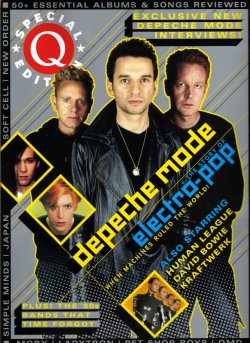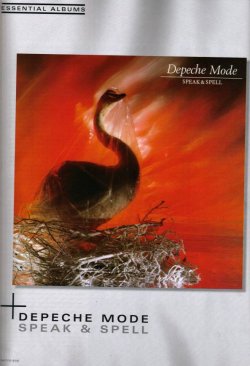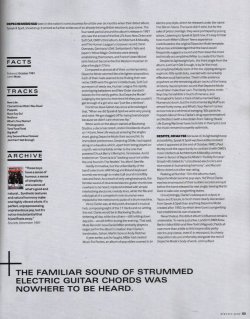- Joined
- Aug 15, 2019
- Messages
- 7,493
- Reaction score
- 143
- Points
- 63
Depeche Mode - Speak & Spell (Essential Albums)
[Q, 14th January 2005. Words: Johnny Black.]



Depeche Mode had been in the nation’s consciousness for a little over six months when their debut album, Speak & Spell, showed up. It arrived as further evidence of an already thriving British electronic pop scene. The four-week period around the album’s release in 1981 also saw the arrival of the first LPs from New Order and Soft Cell, OMD’s third album, Architecture & Morality, and the Human Leagues crossover record, Dare!. Overseas, Germany’s DAF, Switzerland’s Yello and Japan’s Yellow Magic Orchestra were already establishing themselves, and France’s Jean Michel Jarre had just become the first Western musician to play a live gig in China.
Compared to almost all of their contemporaries, Depeche Mode seemed like a far lighter proposition. Each of their rivals seemed to be finding their own niche: OMD were the genre’s intellectuals, Soft Cell purveyors of seedy sex, Human League the rapidly evolving big balladeers and New Order standard-bearers for the darkly gothic. But Depeche Mode? Judging by the lyrics to their third hit they just couldn’t get enough of a girl who was “just like a rainbow” [sic].
Frontman Dave Gahan has since acknowledged that, “When we did Speak & Spell we were very young and naïve. We got slagged off for being teenybopper because we didn’t care what was hip.”
When work on the album started at Blackwing Studios, a deconsecrated London Docklands church on 14 June, New Life was just entering the singles chart, giving Depeche Mode their second hit. Its immediate predecessor, Dreaming Of Me, had nipped along on a bassline which, apart from being played on a synth, was remarkably similar to the one that powered Chuck Berry’s Memphis, Tennessee. And it ended on an “Oooh la la la” backing vocal not unlike the one found in The Beatles’ You Won’t See Me.
Hardly innovative, but the unfamiliarity of the band’s electronic ARP, Moog and Roland keyboard sounds was enough to make it all sound incredibly new and fresh. As a result of only using keyboards, the familiar sound of strummed electric guitar chords was nowhere to be heard, replaced instead with simple interlocking electronic melody lines, while the fills and rolls typical of a competent rock drummer were replaced to the metronomic pulse of a drum machine.
Vince Clarke was, at this point, the band’s musical hub, composing eight of the 11 tracks and co-writing the rest. Clarke would be in Blackwing Studios tinkering all day, while the others – still holding down day jobs – would drift in during the evening. That said, Mute Records’ boss Daniel Miller probably played a larger part in the album’s creation than Clarke’s bandmates, Gahan, Martin Gore or Andy Fletcher.
A year earlier, just for laughs, Miller had created Music For Parties, an album of pop oldies covered in an electro-pop style, which he released under the name The Silicon Teens. The band didn’t exist, but for the sake of press coverage, they were portrayed by young actors. Listening to Speak & Spell now, it’s easy to hear how much Miller’s Silicon Teens experience contributed to the original Depeche Mode template. Gahan has acknowledged that the band would frequently suggest a sound and then leave the more technically accomplished Miller to create it for them.
Despite its lightweight lyric, the third single from the album, Just Can’t Get Enough, is by far the most accomplished Mode track of the era, zipping along on euphoric little synth licks, overlaid with remarkably effective vocal harmonies. There’s little evidence anywhere on the remaining album tracks of the heavy, sinisterly claustrophobic sound that Depeche Mode would later make their own. The faintly homo-erotic Boys Say Go! exhibits a touch of menace, and Photographic bears a trace of dehumanised Gary Numanoid doom, but the instrumental Big Muff is an almost funky romp, and What’s Your Name? comes across now as a whimsical swinging ’60s pastiche. Puppets (about Vince Clarke’s drug experimentation) and NoDisco (with a line stolen from Talking Heads’ Life During Wartime) have more bite in their lyrics, but the music remains buoyantly optimistic.
Despite, or maybe because of, its lightweight pop accessibility, Speak & Spell was favourably received when it appeared at the end of October. NME’s Paul Morley took the opportunity to contrast it with OMD’s more intellectual Architecture & Morality, coming down in favour of Depeche Mode’s “bubbly-fun pop”. Smash Hits hailed its “uncluttered electronics and nice voices in humanising harmony”, and Record Mirror doled out a five-star rating.
Peaking at Number 10 in the albums chart, Depeche Mode became pop stars. Yet Vince Clarke, was less enamoured of their sudden success and quit before the band released its next single, leaving Martin Gore to take over songwriting duties.
Unsurprisingly, Clarke’s subsequent output, in Yazoo and Erasure, is much more clearly descended from Speak & Spell than anything Depeche Mode created after 1983, by which time Gore’s songwriting had established its own character.
Nevertheless, the debut album’s influence remains undeniable. To name just a few, London’s DMX Krew, Berlin’s Miss Kittin and New York’s Magnetic Fields all owe more than a little to this irrepressibly perky electro-pop classic, even if, in retrospect, its cheery disposition sits uncomfortably alongside the rest of Depeche Mode’s body of work.
[Q, 14th January 2005. Words: Johnny Black.]



Interesting combination of a review of Depeche Mode's first album with the circumstances that brought it - and the band - into being. The review focuses less on the tracks themselves and more on putting the band into context with other electronic music in 1981. With the benefit of 23 years of hindsight, the author manages to be more complimentary than other reviewers.
" OMD were the genre’s intellectuals, Soft Cell purveyors of seedy sex, Human League the rapidly evolving big balladeers and New Order standard-bearers for the darkly gothic. But Depeche Mode? Judging by the lyrics to their third hit they just couldn’t get enough of a girl who was “just like a rainbow”. "
Depeche Mode had been in the nation’s consciousness for a little over six months when their debut album, Speak & Spell, showed up. It arrived as further evidence of an already thriving British electronic pop scene. The four-week period around the album’s release in 1981 also saw the arrival of the first LPs from New Order and Soft Cell, OMD’s third album, Architecture & Morality, and the Human Leagues crossover record, Dare!. Overseas, Germany’s DAF, Switzerland’s Yello and Japan’s Yellow Magic Orchestra were already establishing themselves, and France’s Jean Michel Jarre had just become the first Western musician to play a live gig in China.
Compared to almost all of their contemporaries, Depeche Mode seemed like a far lighter proposition. Each of their rivals seemed to be finding their own niche: OMD were the genre’s intellectuals, Soft Cell purveyors of seedy sex, Human League the rapidly evolving big balladeers and New Order standard-bearers for the darkly gothic. But Depeche Mode? Judging by the lyrics to their third hit they just couldn’t get enough of a girl who was “just like a rainbow” [sic].
Frontman Dave Gahan has since acknowledged that, “When we did Speak & Spell we were very young and naïve. We got slagged off for being teenybopper because we didn’t care what was hip.”
When work on the album started at Blackwing Studios, a deconsecrated London Docklands church on 14 June, New Life was just entering the singles chart, giving Depeche Mode their second hit. Its immediate predecessor, Dreaming Of Me, had nipped along on a bassline which, apart from being played on a synth, was remarkably similar to the one that powered Chuck Berry’s Memphis, Tennessee. And it ended on an “Oooh la la la” backing vocal not unlike the one found in The Beatles’ You Won’t See Me.
Hardly innovative, but the unfamiliarity of the band’s electronic ARP, Moog and Roland keyboard sounds was enough to make it all sound incredibly new and fresh. As a result of only using keyboards, the familiar sound of strummed electric guitar chords was nowhere to be heard, replaced instead with simple interlocking electronic melody lines, while the fills and rolls typical of a competent rock drummer were replaced to the metronomic pulse of a drum machine.
Vince Clarke was, at this point, the band’s musical hub, composing eight of the 11 tracks and co-writing the rest. Clarke would be in Blackwing Studios tinkering all day, while the others – still holding down day jobs – would drift in during the evening. That said, Mute Records’ boss Daniel Miller probably played a larger part in the album’s creation than Clarke’s bandmates, Gahan, Martin Gore or Andy Fletcher.
A year earlier, just for laughs, Miller had created Music For Parties, an album of pop oldies covered in an electro-pop style, which he released under the name The Silicon Teens. The band didn’t exist, but for the sake of press coverage, they were portrayed by young actors. Listening to Speak & Spell now, it’s easy to hear how much Miller’s Silicon Teens experience contributed to the original Depeche Mode template. Gahan has acknowledged that the band would frequently suggest a sound and then leave the more technically accomplished Miller to create it for them.
Despite its lightweight lyric, the third single from the album, Just Can’t Get Enough, is by far the most accomplished Mode track of the era, zipping along on euphoric little synth licks, overlaid with remarkably effective vocal harmonies. There’s little evidence anywhere on the remaining album tracks of the heavy, sinisterly claustrophobic sound that Depeche Mode would later make their own. The faintly homo-erotic Boys Say Go! exhibits a touch of menace, and Photographic bears a trace of dehumanised Gary Numanoid doom, but the instrumental Big Muff is an almost funky romp, and What’s Your Name? comes across now as a whimsical swinging ’60s pastiche. Puppets (about Vince Clarke’s drug experimentation) and NoDisco (with a line stolen from Talking Heads’ Life During Wartime) have more bite in their lyrics, but the music remains buoyantly optimistic.
Despite, or maybe because of, its lightweight pop accessibility, Speak & Spell was favourably received when it appeared at the end of October. NME’s Paul Morley took the opportunity to contrast it with OMD’s more intellectual Architecture & Morality, coming down in favour of Depeche Mode’s “bubbly-fun pop”. Smash Hits hailed its “uncluttered electronics and nice voices in humanising harmony”, and Record Mirror doled out a five-star rating.
Peaking at Number 10 in the albums chart, Depeche Mode became pop stars. Yet Vince Clarke, was less enamoured of their sudden success and quit before the band released its next single, leaving Martin Gore to take over songwriting duties.
Unsurprisingly, Clarke’s subsequent output, in Yazoo and Erasure, is much more clearly descended from Speak & Spell than anything Depeche Mode created after 1983, by which time Gore’s songwriting had established its own character.
Nevertheless, the debut album’s influence remains undeniable. To name just a few, London’s DMX Krew, Berlin’s Miss Kittin and New York’s Magnetic Fields all owe more than a little to this irrepressibly perky electro-pop classic, even if, in retrospect, its cheery disposition sits uncomfortably alongside the rest of Depeche Mode’s body of work.
